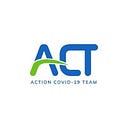Caring through Covid-19 — ACT’s approach to mental health awareness
By — Sweta Daga
When it became clear to the world that the novel Coronavirus, COVID-19 wasn’t going anywhere, countries began healthcare procedures to prevent the spread of the pandemic through public awareness campaigns and national lockdowns. While doctors worked on ailments of the physical kind, there was another issue that was beginning to show.
“There was so much uncertainty in March and April,” says Ramni Kaushik, a counseling psychologist, who is part of the COVID Response team. “We could see small indicators drawn from our own personal lives; we could see how this transition into total lockdown was impacting us so we could imagine how it must be for those who are even more vulnerable. We became more aware of certain fears that people were facing, and it was getting difficult for people to watch the news. People were becoming more anxious about losing a loved one, people were scared to lose their jobs, and this situational factor of COVID left many in shock and grief. Those who were suffering from mental health issues even before COVID just had their symptoms aggravated.”
COVID Response is a collaboration by three organizations: Mind Piper, I AM Well-Being, and Sochara. They started a crisis counseling platform and helpline and received more than 700 applications of volunteer counselors who wanted to help. They trained 350 counselors to begin working on the helpline and are providing counseling services to current COVID patients, those who have survived, and their families.
Kaushik continues, “We were all motivated to reach as many people as possible, so we decided to work together. We had only started as a 6 week project but with ACT’s vital support they helped structure us to help more people when they saw the impact that we could create. We are working closely with the Delhi government and the Delhi Commision of Child Rights. Through ACT we got connected with Step One and are working in more states.”
Shrrinesh Bala, a volunteer with ACT on the mental health vertical explains, “Realising that mental health would be a looming crisis, we had a separate track for it from the start. Speaking to mental health experts, 70+ ACT grants applicants, and grassroot government officials, we realised that it was more of a need of the hour. So we built our strategy focused on preservation of mental health of the most marginalized groups- frontline workers, blue collar workers, COVID patients and their family members, pregnant women, and the elderly. One grantee group in Karnataka called ASHA workers and checked in on them, and it really made a difference. Even one conversation can mean a lot, and showing care was a vital part of how we gave grants because COVID related stress and anxiety was different from other mental illnesses.”
Part of that approach for care was Dost Education. Arushi Wasan who is part of Dost Education’s core team describes their approach. “Before COVID, we focused on early childhood development through phone radio programs to promote play-based learning to involve parents. When COVID hit, we called many of the families we work with and tried to help where we could, and at first we helped supply rations, but we quickly realized that where we could really help was supporting the parents. Parents were struggling and that impacted the child. We began to build very specific content to help parents take care of themselves and their families. We focused on mental wellness, not exactly counseling but some tips and some ways to bring joy into their lives.”
The team realized that other organizations were looking for technology based content solutions and started partnering with others on the ground who were working on outreach. “Our approach was easy — all people had to do was drop a missed call and they were onboarded for 6 weeks of content: mental wellness and COVID awareness,” explains Wahan. “We provided tips like simple grounding exercises, or breathing techniques to help build resilience for the parent and child. We realized that first parents need support so that they can better support their children. We provided information about COVID awareness dos and don’ts, and for example, ways that handwashing could be turned into a game, or how to create new routines for the parent and child. After 6 weeks, we had an ongoing program that people could continue with if they chose.”
She concludes, “We focus on lower to middle income families like daily wage workers and factory workers, but families who are motivated for their child to receive education, wanted to provide our service for free, and because of ACT we were able to do that. They provided us with our first grant in India. ACT funded us in May and really scaled the program. Now we are able to reach even more people.”
